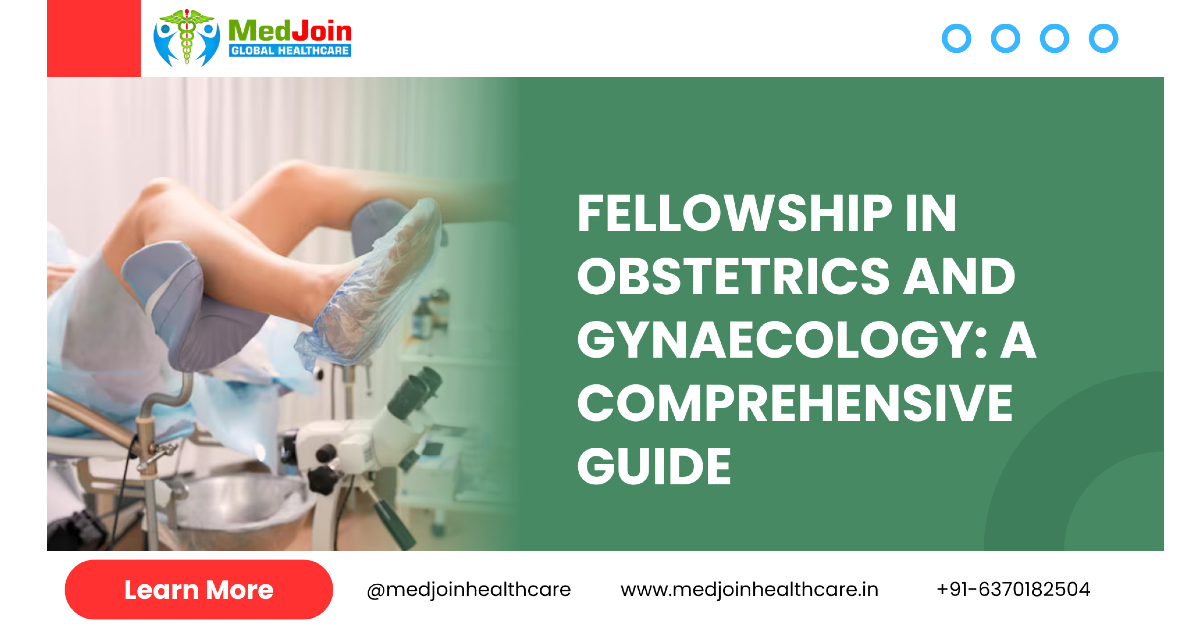
Obstetrics and Gynaecology (OB-GYN) is one of the most dynamic and essential branches of medicine, dedicated to women’s reproductive health, pregnancy, childbirth, and related disorders. With continuous advancements in maternal and reproductive healthcare, there is an ever-growing demand for skilled specialists who can deliver evidence-based, patient-centered care.
A Fellowship in Obstetrics and Gynaecology provides postgraduate doctors with specialized training, enhancing their expertise in managing complex gynecological and obstetric cases, surgical procedures, and high-risk pregnancies.
This fellowship bridges the gap between postgraduate education and independent clinical practice, equipping doctors with both theoretical knowledge and hands-on experience in women’s health.
Overview of the Fellowship
The Fellowship in Obstetrics and Gynaecology is a structured academic and clinical training program designed for medical graduates (MBBS/MD/DNB) who aspire to advance their careers in reproductive medicine, maternal care, and gynaecological surgery.
The fellowship typically spans 12 to 24 months, depending on the institution, and covers a comprehensive curriculum that integrates advanced clinical exposure, surgical training, and research development.
Objectives of the Fellowship
The key goals of this fellowship include:
-
Enhancing Clinical Competence:
To develop advanced clinical skills for diagnosing and managing complex obstetric and gynaecological conditions. -
Surgical Expertise:
To train fellows in performing minor and major gynaecological surgeries, including laparoscopic and hysteroscopic procedures. -
Research and Evidence-Based Practice:
To encourage participation in clinical research, case studies, and publication of scientific papers. -
Patient-Centered Care:
To cultivate empathy, ethical practice, and holistic approaches in women’s healthcare. -
Leadership and Teaching Skills:
To prepare fellows for roles as academic leaders, consultants, and mentors in medical institutions.
Eligibility Criteria
The eligibility for enrolling in a Fellowship in Obstetrics and Gynaecology generally includes:
- A recognized MBBS degree with a valid medical registration.
- Preference or requirement for MD/DNB/DGO in Obstetrics and Gynaecology (depending on the program).
- Commitment to full-time clinical and academic participation throughout the fellowship.
- Some institutions may require candidates to undergo a written test and/or interview.
Duration of the Program
The duration of the fellowship varies depending on the institution and specialization. Generally, it ranges between:
- 12 months (1 year) for basic or advanced certificate fellowships.
- 18–24 months (2 years) for comprehensive or super-specialty programs involving extensive research and surgical training.
Curriculum and Training Modules
The curriculum of the Fellowship in Obstetrics and Gynaecology** is carefully designed to provide well-rounded exposure to both obstetric and gynaecological domains. It typically includes the following modules:
1. Obstetrics Module
- Antenatal, intrapartum, and postnatal care
- High-risk pregnancy management (hypertension, diabetes, preeclampsia, etc.)
- Fetal surveillance and monitoring
- Labour management and normal delivery techniques
- Complicated deliveries and obstetric emergencies
- Perinatal and neonatal care
- Family planning and contraception counseling
2. Gynaecology Module
- Menstrual disorders and hormonal dysfunctions
- Infertility evaluation and management
- Urogynaecology and pelvic floor disorders
- Gynaecological oncology – early detection and management
- Endometriosis and chronic pelvic pain
- Minimally invasive surgeries (laparoscopic & hysteroscopic)
- Menopause management and hormone replacement therapy
3. Surgical Training
- Minor surgical procedures: D&C, biopsy, cervical cerclage, etc.
- Major surgeries: Hysterectomy (abdominal, vaginal, laparoscopic), myomectomy, ovarian cystectomy
- Advanced laparoscopic and endoscopic skills training
- Emergency procedures for obstetric hemorrhage and ectopic pregnancy
4. Research and Academics
- Participation in seminars, workshops, and case discussions
- Research project or dissertation submission
- Paper presentation and publication in journals
- Continuous evaluation and assessments
5. Clinical Rotations
Fellows are usually rotated through different units and departments such as:
- Labour ward
- Antenatal and postnatal clinics
- Family planning units
- Operation theatre and emergency services
- Infertility and IVF centers
Skills and Competencies Acquired
Upon completing the fellowship, candidates acquire diverse competencies that prepare them for independent clinical practice and academic leadership:
- Mastery of antenatal and perinatal care.
- Proficiency in managing obstetric complications such as preeclampsia, eclampsia, placenta previa, and postpartum hemorrhage.
- Surgical expertise in gynaecologic and obstetric procedures.
- Ability to interpret ultrasound and diagnostic imaging in obstetrics and gynaecology.
- Advanced skills in laparoscopic and hysteroscopic surgery.
- Capability to handle infertility and reproductive endocrinology cases.
- Leadership and communication skills for patient care and interdisciplinary teamwork.
Specialization Areas
Depending on the institution, fellows can choose subspecialty training within the field, such as:
- Reproductive Medicine and Infertility
- Maternal-Fetal Medicine
- Gynaecologic Oncology
- Urogynaecology
- Minimal Access Surgery in Gynaecology
- Perinatology
- Adolescent Gynaecology
Assessment and Certification
Throughout the fellowship, candidates undergo both formative and summative assessments. These include:
- Periodic internal assessments
- Practical examinations and viva voce
- Submission of case logs and surgical records
- Evaluation of research work and thesis
- Final exit examination (theory + practical)
Upon successful completion, fellows receive a Fellowship Certificate in Obstetrics and Gynaecology from the recognized institution or university, which significantly enhances their professional credentials.
Career Opportunities After Fellowship
The Fellowship in Obstetrics and Gynaecology opens up numerous professional pathways across clinical, academic, and research domains. Graduates can pursue:
1. Clinical Practice
Fellows can work as:
- Consultant Obstetrician and Gynaecologist
- Senior Resident or Specialist in hospitals and clinics
- Maternal-fetal medicine or infertility specialist
2. Academic and Teaching Roles
- Faculty positions in medical colleges and universities
- Mentorship roles for postgraduate students
- Research guides and conference speakers
3. Private Practice and Hospital Administration
- Establishing a private clinic or maternity center
- Managing obstetric and gynecological departments in multispecialty hospitals
- Leading healthcare initiatives for women’s health
4. International Opportunities
-
Many fellows pursue further subspecialty training or jobs abroad in countries like the UK, Australia, UAE, and the USA, where skilled obstetricians and gynaecologists are in high demand.
Benefits of Pursuing the Fellowship
- Advanced Expertise: Gain specialized knowledge beyond the postgraduate level.
- Clinical Confidence: Develop proficiency in managing complex cases and surgical procedures.
- Professional Recognition: Enhance career prospects with certified credentials.
- Networking: Collaborate with leading specialists, research teams, and international experts.
- Patient Impact: Contribute to improved maternal and reproductive health outcomes.
Several reputed e-learning platforms also provide online or hybrid fellowships, enabling working doctors to upgrade their qualifications without disrupting clinical practice.
Research and Future Prospects
The field of obstetrics and gynaecology continues to evolve with innovations in fetal medicine, assisted reproductive technologies, genetic counseling, and minimally invasive surgery.
Fellowship-trained specialists are at the forefront of these advancements, contributing to clinical research, medical device innovation, and public health policies focused on women’s health.
Emerging technologies such as AI-based fetal monitoring, robotic surgery, and personalized reproductive care are redefining the scope of this specialty — making fellowship-trained professionals indispensable in the modern medical landscape.
A Fellowship in Obstetrics and Gynaecology is an invaluable academic and clinical advancement for doctors aiming to specialize in women’s healthcare. It not only enhances professional skills but also deepens understanding of the intricate physiological and emotional aspects of female health.
From managing high-risk pregnancies to performing complex gynaecological surgeries, fellowship-trained specialists play a vital role in improving maternal and reproductive outcomes worldwide. With structured training, academic enrichment, and clinical exposure, this fellowship empowers doctors to become leaders in one of the most vital domains of modern medicine.






